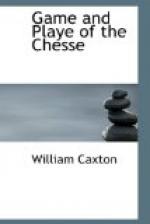haue more plente of bestes/ and her thynges multiplye
more than myn/ and therfore thou oughtest knowe that
enuye is the most grettest dedely synne that is/ for
she tormenteth hym that hath her wythin hym/ wyth
oute tormentynge or doyng ony harme to hym/ on whome
he hath enuye. And an enuyous man hath no vertue
in hymself/ for he corrumpeth hymself for as moche
as he hateth allway the welthe and vertues of other/
and thus ought they to kepe them that they take none
euyll suspec[=o]n For a man naturally whan his affection
hath suspecion in ony man that he weneth that he doth/
hit semeth to hym verily that it is doon. And
hit is an euyll thynge for a man to haue suspecion
on hymfelf/ For we rede that dionyse of zecyll a tyrant
Was so suspecionous that he had so grete fere and
drede For as moche as he was hated of all men/ that
he putte his frendes oute of theyr offices that they
had/ And put other strangers in theyr places for to
kepe his body/ and chese suche as were ryght Cruell
and felons/ And for fere and doubte of the barbours/
he made hys doughters to lerne shaue and kembe/ And
whan they were grete. He wold not they shold
vse ony yron to be occupied by them/ but to brenne
and senge his heeris/ and manaced them and durst not
truste in them/ And in lyke wyse they had none affiance
in hym And also he dyde do enuyronne the place where
he laye wyth grete diches and brode lyke a castell/
And he entryd by a drawbrygge whiche closyd after
hym/ And hys knyghtes laye wyth oute wyth his gardes
whiche wacchid and kept straytly thys forteresse/
And whan plato sawe thys Dionyse kynge of cezille thus
enuyronned and set aboute wyth gardes & wacche-men
for the cause of his suspecion sayd to hym openly
to fore all men kinge why hast thou don so moche euyll
& harme/ that the behoueth to be kept wyth so moche
peple/ And therfore I saye that hit apperteyneth not
to ony man that wylle truly behaue hym self in his
werkis to be suspecyous/ And also they ought to be
stronge and seure in theyr werkes/ And specyally they
that ben maysters and maronners on the see/ for yf
they be tumerous and ferdfull they shold make a ferde
them that ben in theyr shippis/ that knowe not the
paryls/ And so hit might happene that by that drede
and fere alle men shold leue theyr labour/ And so
they myght be perisshid and despeyred in theyr corages/
For a shippe is soone perisshid and lost by a lityll
tempest/ whan the gouernour faylleth to gouerne his
shippe for drede/ And can gyue no counceyll to other
than it is no meruayll/ thangh they be a ferd that
ben in his gouernance/ And therfore ought be in them
strengthe force and corage/ and ought to considere
the peryls that might falle/ And the gouernour specially
ought not to doubte/ And if hit happen that ony paryll
falle/ he ought to promyse to the other good hoope/
And hit apperteyneth well/ that a man of good and hardy
corage be sette in that office/ In suche wyse that
he haue ferme and seure mynde ayenst the paryls that
oftetymes happen in the see/ and with this ought the
maroners haue good and ferme creance and beleue in
god/ and to be of good reconforte & of fayr langage
vnto them that he gouerneth in suche paryls/ And this
sufficeth to yow as touchynge the labourers.




